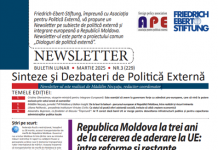A new €1.5 million project that will boost the fight against organised crime and human trafficking in Azerbaijan, Bosnia-Herzegovina, Moldova and Turkey has been launched by the European Union.
This innovative pilot project will help countries to be better equipped to deal with human trafficking, for example through sharing data on trafficking and providing training for law enforcement agencies on how to deal with the issue more effectively. At the same time, it will promote regional cooperation on this issue through sharing information and best practice between countries and regions. This is essential given the fact that most trafficking cases take place across several countries.
Launching the project, Commissioner for Enlargement and European Neighbourhood Policy Štefan Füle stated: "We are determined to do all we can to work across borders and nations to bring an end to this evil activity of trafficking people wherever it takes place. By strengthening laws, sharing information and increasing levels of awareness of the problem across the region, we hope to lay the foundations for further action in this area and send a clear message to traffickers that this barbaric and deplorable form of exploitation cannot continue."
Development Commissioner Andris Piebalgs said: "I find it absolutely shocking that in the 21st century, human trafficking continues. Organised crime is a virus that knows no borders, so the remedy must also strike across borders not only to protect the victims, but also EU citizens. That’s why projects like this are so vital și it is only by countries working together that we are likely to see an end to this terrible scourge on modern society."
Cecilia Malmström, Commissioner for Home Affairs, said: "Trafficking in human beings cannot be tolerated in any form, be it in Europe or anywhere else in the world. We need to work with partner countries and organisations to provide a strong and unequivocal response to this fundamental violation of human rights."
Human trafficking (also known as ‘modern slavery) results in gross violations of human rights and is also a particularly lucrative form of organised crime which generates profits of dozens of billions of euros each year. Millions of women, men and children are being trafficked every year for the purposes of commercial sexual exploitation, forced labour or even organ removal.
The project is one of the actions in the EU Strategy towards the Eradication of Trafficking in Human Beings 2012-2016, adopted by the Commission 19 June 2012. It complements the work of the Commission also in relation to the collection of statistical data on trafficking in human beings, for which the Commission will publish a report spring 2013. It also links to the work on the Action Oriented Paper on strengthening the EU external dimension on action against trafficking in human beings.
The project launched in early 2013 is a first pilot phase. By mid-2014 a second phase is expected to consolidate its results and broaden the scope by addressing not only law enforcement, but also assistance and protection of victims. More countries are also expected to join the project in the second phase.
Background
More in detail, this project aims to:
-Improve systems of data collection, analysis and exchange at the national and transnational level to increase the knowledge on the scale and nature of trafficking in human beings;
-Promote and assist in information sharing and regional coordination on trafficking in human beings;
-Enhance national and transnational law enforcement cooperation and the capacity of prosecutors, consular and non-governmental organisations’ staff to address the crime of trafficking in human beings more efficiently.
-This first pilot phase, focusing on law enforcement, is financed by the European Union under its Instrument for Stability.
The Instrument for Stability
The EU Instrument for Stability (IfS) aims to link security and development. The main objective is to support measures to safeguard or to re-establish the conditions under which partner countries of the EU can pursue their long term development goals.
The Instrument fills gaps where geographical or other development instruments cannot be used; and should be used to address trans-regional threats to security. Since 2007 the EU has supported a number of projects to counter trans-regional organised crime and terrorism under the IfS.






